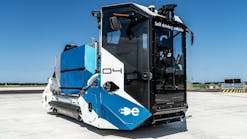Brussels Airport Announces Plans for Baggage System Upgrades And Investments in Ergonomic Infrastructure
After recent investments to upgrade baggage security screening to the latest standards, Brussels Airport is now investing in new baggage sorting systems, loading zones and storage areas. The new system will be more efficient, offer greater capacity and handle peaks even better.
Investments are also being made in a more ergonomic workplace for baggage handlers by introducing semi-automated loading systems and lifting aids. The tender for the new baggage system has now been launched, and the entire project is expected to be completed by 2028.
Every day, Brussels Airport's baggage system processes at least 40,000 pieces of baggage. The baggage system is a complex network of over 20 kilometers of conveyor belts, including baggage screening devices, that requires continuous maintenance. After upgrading the baggage screening system in recent years to meet the latest standards, another major part of the infrastructure is now being renewed.
The part of the baggage sorting system to be upgraded includes early baggage storage, baggage container logistics and modern loading infrastructure, all supported by a new IT solution. Brussels Airport is investing in this new high-performance and sustainable baggage system to at least maintain the high on-time baggage delivery rate, allow for growing passenger numbers and provide an ergonomic workplace for airport staff.
Specifically, eight new automatic and semi-automatic loading areas will be installed and early baggage storage for 3,000 pieces of baggage from passengers who check in early will be provided, in addition to the current capacity of 1,200 pieces of baggage already available. Container storage capacity will also be increased. It will be a high-capacity modular system that can be adjusted based on demand. The increased level of automation and the lifting aids will enhance ergonomics, making the work of baggage handlers less physically demanding and more appealing.
The tender for the project was recently launched, and the first modules are scheduled to be rolled out in 2026. The entire project is expected to be completed by 2028.







